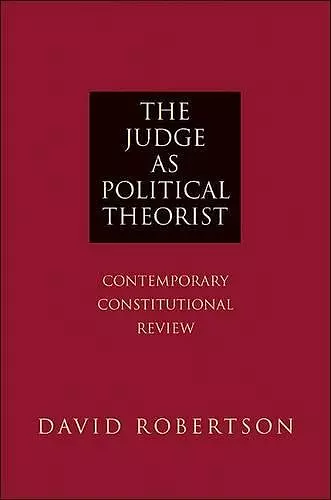The Judge as Political Theorist
Contemporary Constitutional Review
Format:Paperback
Publisher:Princeton University Press
Published:6th Jul '10
Currently unavailable, and unfortunately no date known when it will be back

This is a book by a political scientist that goes well beyond the political-science literature on constitutional courts and constitutional adjudication. Robertson sees new types of constitutions emerging that are not just legal documents structuring the political system, but are designed to give binding force to those values to which a society aspires, in most cases after a deep break in their history. This is a remarkable piece of research. -- Dieter Grimm, Humboldt University of Berlin and Yale Law School I very much enjoyed reading The Judge as Political Theorist. I learned an immense amount. The book will be useful both to legal academics and to students. -- Sanford V. Levinson, University of Texas, Austin
Examines opinions by constitutional courts in liberal democracies to better understand the logic and nature of constitutional review. This book argues that the constitutional judge's role is nothing like that of the legislator or chief executive, or even the ordinary judge.The Judge as Political Theorist examines opinions by constitutional courts in liberal democracies to better understand the logic and nature of constitutional review. David Robertson argues that the constitutional judge's role is nothing like that of the legislator or chief executive, or even the ordinary judge. Rather, constitutional judges spell out to society the implications--on the ground--of the moral and practical commitments embodied in the nation's constitution. Constitutional review, in other words, is a form of applied political theory. Robertson takes an in-depth look at constitutional decision making in Germany, France, the Czech Republic, Poland, Hungary, Canada, and South Africa, with comparisons throughout to the United States, where constitutional review originated. He also tackles perhaps the most vexing problem in constitutional law today--how and when to limit the rights of citizens in order to govern. As traditional institutions of moral authority have lost power, constitutional judges have stepped into the breach, radically altering traditional understandings of what courts can and should do. Robertson demonstrates how constitutions are more than mere founding documents laying down the law of the land, but increasingly have become statements of the values and principles a society seeks to embody. Constitutional judges, in turn, see it as their mission to transform those values into political practice and push for state and society to live up to their ideals.
"Robertson offers the field of comparative judicial politics a thoughtful, carefully researched book that confronts conventional wisdom on constitutional courts and jurists... An exceptional book."--Choice "The book is fascinating for some of its arguments in relation to the position of judges in liberal democracies and will be of interest to scholars of both law and politics."--Kawu Bala, Political Studies Review "The Judge as Political Theorist contains an interesting and well-presented argument that re-imagines the job of judges who render decisions on constitutional matters... [G]enerally his conclusions make intuitive sense and are supported by tangible evidence. Furthermore, at a systematic level, Robertson's portrayal of various constitutional courts choosing alternative approaches to solve a shared set of general political problems fits nicely with theories trying to explain the unique position of the court as a non-political actor that must make inherently political decisions that define the role of government in society."--Matt Hartz, Journal of International Law and Politics
ISBN: 9780691144047
Dimensions: unknown
Weight: 567g
432 pages